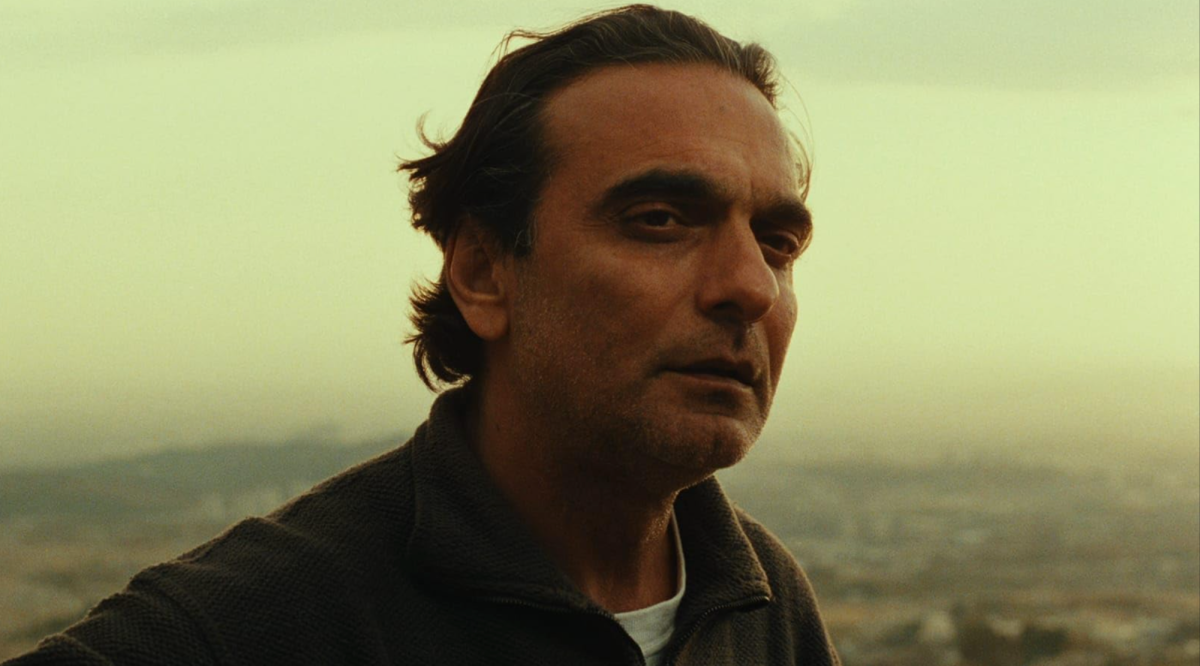
IMDB

Content warning: This article references suicide. Please refer to the end of the article for on- and off-campus resources.
In my 17 movie reviews, I’ve never given a full five-star rating — until now.
Directed by Iranian filmmaker Abbas Kiarostami, “Taste of Cherry” follows Mr. Badiei (Homayoun Ershadi), who spends the day searching for someone willing to bury his body after he takes his own life. Despite how heavy the subject matter sounds, it is a very peaceful and slow watch. “Taste of Cherry” earns its widely considered belief as one of the best and most influential minimalistic films to date.
The filmmaking in this movie is simply incredible. Everything from the shot composition to the cinematography to the sound mixing is remarkably simple yet deeply immersive. It truly puts you in the passenger seat of the story, right alongside Mr. Badiei and the people he encounters. While minimalist, each scene is strikingly beautiful. The flat shots are particularly stunning, with gorgeous backgrounds reminiscent of a Wes Anderson film. This simplicity perfectly reinforces the film’s central theme: Life is worth living because of its small, everyday moments. Whether it’s watching a plane glide across the sky, hearing a child’s laughter or savoring the taste of cherries, these fleeting details make life precious, no matter the hardships one faces.
Beyond its cinematography, the film’s sound design is unparalleled and deeply detailed. It’s mixed in a way that makes the audience feel like they are inside the world of the movie. If a character is speaking from another room, their voice is muffled just as it would be in real life. As Mr. Badiei drives, you hear the crunch of gravel under his tires. Snippets of conversation drift in and out as he passes different groups of people. These details create an immersive, almost voyeuristic experience.
The writing is just as masterful. We never fully understand why Mr. Badiei wants to end his life. We know he feels deeply lonely, and we can infer that he has had a falling out with his son, but the specifics remain vague. This ambiguity allows the audience to project their own struggles onto the character, rendering him a deeply relatable figure. Combined with the film’s first-person perspective, it feels less like we’re watching a story unfold and more like we’re being asked to reflect on our own lives and the beauty we may be overlooking.
This deeply personal approach extends to the long, thoughtful conversations Mr. Badiei has throughout the film. His interactions give us a rare, intimate look at everyday life in Iran. He speaks with a young soldier, a seminary student training to become an imam, a security guard overseeing a construction site and an older man who has overcome his own suicidal thoughts. These conversations offer a firsthand glimpse into the motivations, struggles and daily realities of people from different walks of life in the country. The result is a film that feels both universal and deeply specific.
That said, “Taste of Cherry” isn’t for everyone. It’s an artsy, slow-moving film that some viewers might find boring. This was my second time watching it, and I found it resonated with me more on the rewatch. The first time, I appreciated its beauty but struggled with the pacing. On this viewing, however, I realized that the film’s slowness isn’t a flaw — it’s intentional. The meditative quality of its pacing allows you to fully absorb each moment. These quiet shots of the sky, the sound of tires crunching on gravel and the distant murmur of background conversations all reinforce the film’s central message that life is fleeting but full of beautiful moments that are worth cherishing. The story’s central contrast — the tranquil atmosphere paired with heavy themes of suicide — only strengthens its emotional impact. There were times I felt my eyes beginning to water when the film started discussing the beauty of life given how well the technical components fit into these dialogues.
This film is a masterpiece. It’s a movie that everyone should watch at least once in their lifetime. Even if you don’t fully appreciate it on your first viewing, even if you find it slow or difficult, there’s nothing else quite like it.
As my first five-star rating, I don’t hand out perfect scores lightly — doing so for just any great movie would diminish what Kiarostami achieves in “Taste of Cherry.” This film isn’t just great. It’s something more. It’s a quiet, contemplative work of art that lingers long after the credits roll. Simply put, it is a masterpiece.
To access mental health resources, reach out to Counseling and Psychiatric Services at 202-687-6985, or for after-hours emergencies, call 202-444-7243 and ask to speak to the on-call clinician. You can also reach out to Health Education Services at 202-687-8949. Both of these resources are confidential.